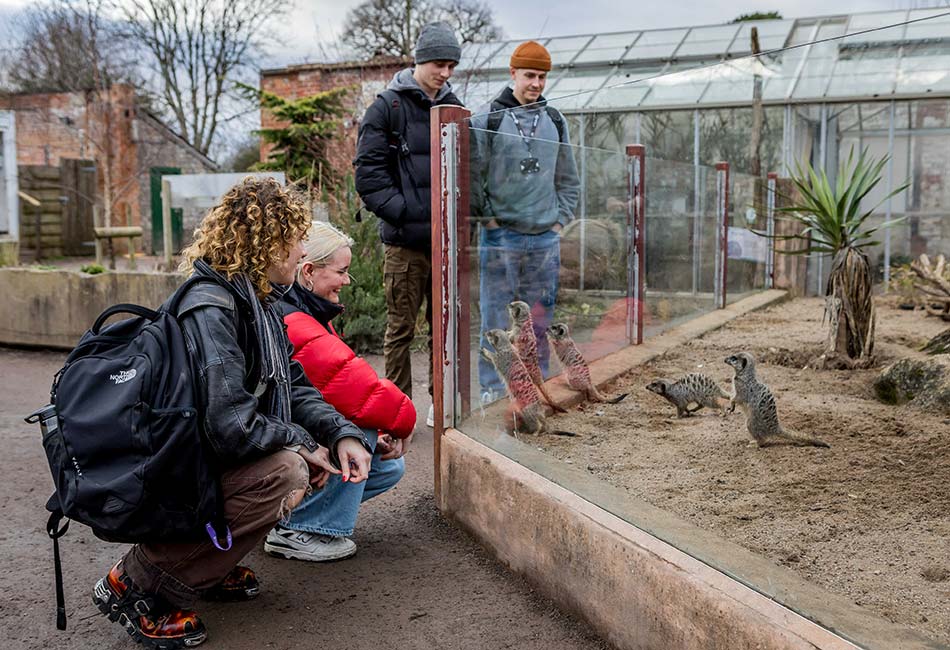
BSc(Hons) Integrated Wildlife Conservation (Top Up)
This course is open for applications
About
Delivered at Frenchay Campus at UWE Bristol, this one-year top-up course enables FdSc Integrated Wildlife Conservation graduates to upgrade to a three-year BSc degree.
Why study Integrated Wildlife Conservation?
Conserving biodiversity and avoiding the mass extinction of species are huge global challenges. We need wildlife conservationists who can use their skills and scientific knowledge to help tackle these issues and explore new approaches to conserving wildlife. By looking at the nature of global biodiversity, and the effects of habitat loss and climate change, you can equip yourself with the knowledge and tools you need to make a difference in this field.
Why UWE Bristol?
BSc(Hons) Integrated Wildlife Conservation one year top-up has been designed to provide an opportunity for those who have already completed a foundation degree in wildlife conservation to top up to a full BSc (Hons) degree. In particular, it provides a progression route for graduates of the FdSc Integrated Wildlife Conservation degree.
The degree explores wildlife conservation issues at local, national and global levels, mixing theory with practice. You'll delve into the relationship between wildlife and society, and consider the impact of human activities on the living world. By exploring the steps that can be taken to alleviate biodiversity decline, you'll gain the skills you need for a career in conservation. You'll also gain valuable hands-on experience through modules in Environmental Consultancy, Remote Sensing, and expedition-based learning.
We are pleased to inform you that Bristol Zoological Society plans to expand as they move to their Bristol Zoo Project location in the next few years. This relocation will enable their team to develop future facing wildlife conservation projects and education facilities. This puts UWE Bristol in the unique position of being co-creators of this state-of-the-art facility, providing exciting new opportunities for you as a wildlife conservation student.
Where can it take me?
You'll be well prepared to go into a wide range of jobs. You could work in national and international wildlife conservation, conservation consultancy, media and wildlife filmmaking, conservation campaigning, wildlife and enterprise, or wildlife conservation research. As a science graduate, your skills will be highly valued and you could go into a range of non-science graduate positions.
Watch: Welcome to the School of Applied Sciences at UWE Bristol
Entry
Typical offers
- GCSE: Grade C/4 in English, Mathematics and Double Science, or equivalent. We do not accept Level 2 Key Skills, Functional Skills or Certificates in Adult Numeracy and Literacy as alternatives to GCSEs.
- English Language Requirement:
If English is not your first language, you'll need to meet the UK Border Agency's and the University's minimum English language requirements such as the International English Language Test (IELTS) overall overall score of 6.5 with no component below 5.5 or overall score of 6.0 with no more than one component at 5.5.
Entry requirements
You should normally hold an HND or Foundation Degree (or equivalent), or have successfully completed the equivalent of 240 UK credit points (120 ECTS credits) in a related subject discipline.
International applicants
If you're applying to UWE Bristol from another country or region, visit the international study pages for tailored application information.
If you're applying to study at UWE Bristol and require additional support to meet our English language requirements, you may be able to attend one of our pre-sessional English courses. Read more about our pre-sessional English Programme.
Read more about entry requirements.
How to apply
Read more about undergraduate applications.
Read more about international applications and key international deadline dates.
For further information
- Email:
UK applicants
Admissions@uwe.ac.ukInternational/EU applicants
International@uwe.ac.uk - Telephone:
UK applicants
+44 (0)117 32 83333International/EU applicants
+44 (0)117 32 86644
Structure
Content
The optional modules listed are those that are most likely to be available, but they may be subject to change.
You'll study:
- Research Dissertation Project.
You'll study optional modules from (the amount depending on credit requirements):
- Contemporary Conservation Science
- Energy, Carbon and Climate
- Environmental and Ecological Consultancy
- Environmental Forensics
- Marine Ecosystems
- Primate Ecology and Conservation
- Remote Sensing and Geographical Information Systems (GIS)
- Science Communication
- Sustainable Futures
- Expedition to a Biodiversity Hotspot
- Wildlife, Film and Media.
The University continually enhances our offer by responding to feedback from our students and other stakeholders, ensuring the curriculum is kept up to date and our graduates are equipped with the knowledge and skills they need for the real world. This may result in changes to the course. If changes to your course are approved, we'll inform you.
Learning and Teaching
The course offers a wide-ranging curriculum taught through lectures, seminars and tutorials, and complemented by laboratory investigations, case studies, workshops, and fieldwork.
Learn about the research methods, field surveys, data analysis and interpretation, essential to the scientific study of wildlife. Use our advanced filmmaking equipment and expertise to produce your own conservation film.
Put theory into practice through regular field work. As well as fieldwork making the most of the rich range of ecosystems surrounding Bristol, there will be where possible an optional expedition to Cuba or Madagascar, or an opportunity to explore marine ecosystems with a residential trip to Cornwall.
Receive one-to-one guidance and feedback throughout from our experienced academic and personal tutors.
See our full glossary of learning and teaching terms.
Assessment
We use different assessment methods to support different learning styles, and the wide range of concepts, knowledge and skills we want you to develop.
You'll be assessed with unseen and open-book exams, essays, practical reports, individual and group projects, oral and visual presentations, case study analysis, and problem-solving exercises. We also use blogs, online portfolios and web page design, to help you develop sought-after e-communication skills.
Learn more about assessments.
Fees
Full time course
Indicative Additional Costs
Supplementary fee information
Additional costs are for items you could need during your studies that aren't covered by the standard tuition fee. These could be materials, textbooks, travel, clothing, software or printing.
Features
Fieldwork
Spend part of your time working in the field and getting to know the spectacular landscapes around Bristol. Where possible, there will be optional field trips to Cornwall, and the chance to go on expedition to Cuba, or to the threatened forests of Madagascar, to study human-wildlife interactions.
You'll investigate a range of natural and semi-natural habitats, and develop the practical skills to study wildlife and conservation science in the field.
Find out about a field trip in Cornwall from our students studying Marine Ecosystems, and read about a recent field trip to a tropical island near Cuba to study the ecosystem.
Study facilities
The course is delivered predominantly at Frenchay campus, at UWE Bristol, with support from experts in wildlife conservation from Bristol Zoo and beyond.
With access to well-equipped science laboratories, a glasshouse and a dedicated field centre at the University, you'll be supported and mentored by a team of specialists at the forefront of their profession.
You'll get to use extensive equipment for fieldwork and field-based laboratory work at our field centres.
Learn more about UWE Bristol's facilities and resources.
Take a personalised virtual tour of the Environmental Science facilities and experience what a typical day could look like here for you.
Personalised virtual tour
There's no need to visit us in person to explore our facilities and campuses. Take a personalised virtual tour and discover it all for yourself from wherever you are.
Take a virtual tourCareers
Careers / Further study
By the end of the course, you'll be well prepared to work with national and international conservation organisations, or ecological consultants such as Wildlife Trusts, The Woodland Trust and other non-government organisations (NGOs).
Practical experience in plant and animal survey work, competency at mapping (GIS), and knowledge of monitoring protected species such as great crested newts, reptiles, bats, badgers or water voles are especially valuable in finding rewarding jobs. If you're interested in conservation education, there are opportunities with the Field Studies Council and other educational organisations. There are also many options for postgraduate study and research degrees. You could specialise in an area such as wildlife filmmaking, science communication or environmental consultancy.
As a graduate, you'll be eligible to apply for a range of postgraduate courses at UWE Bristol, which will give you advanced knowledge and support your career development. These include MSc Forensic Science, MRes Applied Sciences, MSc Science Communication, MSc Applied Wildlife Conservation and MSc Conservation Leadership.
Be inspired
Our award-winning careers service will develop your employment potential through career coaching and help you to find graduate jobs, placements and global opportunities. We can also help find local volunteering and community opportunities, provide support for entrepreneurial activity and get you access to employer events.
Visit our employability pages to learn more about careers, employers and what our students are doing six months after graduating.
Life

Accommodation
An excellent range of options for all of the Bristol campuses and the city centre.

Bristol
A stunning city for student living with all the qualities to make you want to stay.

Sports, societies and activities
There is more to your experience here than study. Choose to make the most of it and try new things.

Health and Wellbeing
We provide support in the way you need it.

Campus and facilities
Discover our campuses and the wealth of facilities provided for our students.

